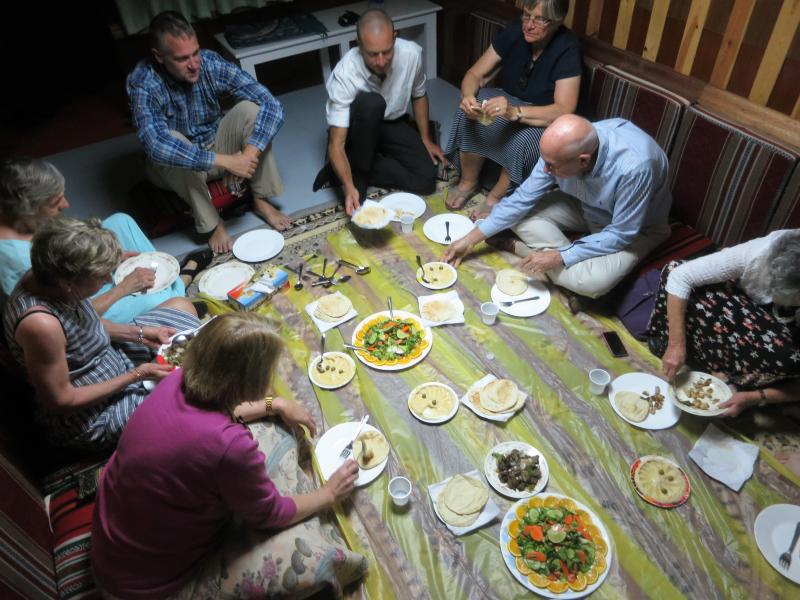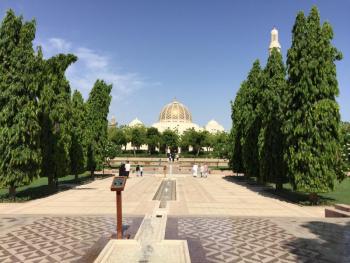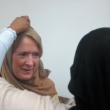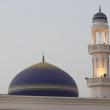The Congregational Church of Boothbay Harbor had a group of 11 parishioners who attended a mission trip to Muscat, Oman in mid-November. Retired Reverend Ken Bradsell, now retired to Boothbay Harbor, was the lead Protestant pastor for two years to the Sultanate of Oman through the Reformed Church of America.
RCA has a large presence in the country’s capital through an ecumenical partnership at the Al Amana Centre, explained Bradsell, and one of the programs at the Centre is to host a variety of groups interested in interfaith dialogue. The Congo Church’s group was one of those.
There are about 700,000 Christians in Oman – from Asia, Africa, Western Europe and North America – which has a population of about 4,000,000. Bradsell said he would lead worship with over 1,000 Christians per week on two different campuses across Muscat.
“(Al Amana today) was the outgrowth of what the centre had been – the old medical missionary housing for a hospital,” said Bradsell. “We had an opportunity to experience that interfaith mission – a safe space in which to respectfully learn about one another.”
Bradsell said he was surprised that when he gave his guest sermon reading in 2016 at the Congo Church, it was not only well received, but sparked some interest in Oman, its culture and the Muslim faith in general.
"That's been an ongoing journey for the congregation – we've done a few things over the last couple years to the Muslim faith – the similarities, differences with Christianity,” said Bradsell.
In November 2018, Boothbay Harbor parishioners were visiting Muscat’s Grand Mosque, the Roman Catholic Church, one of the city’s two Hindu temples, the National Museum, the local tourism university, open marketplaces and several Omani restaurants.
When westerners think of the Middle East, most assume people wear long robes and dresses and various headscarves and most likely by law, said Bradsell, but the Omani do not adhere strictly to traditional dress. Western attire is common, but there has been a social movement lately to modest dress and traditional garb.
“It fits with the Omani social personality,” said Reverend Sarah Foulger, pastor of the Congo Church. “The Omani people are very humble, gracious and hospitable.”
They are also increasingly highly educated, noted Foulger and Bradsell – education is free from early childhood education all the way to doctoral programs for Oman's citizens and equal pay and equal opportunity for women are legislated.
“The sultan is loved by his people because he has single-handedly led the modernization of that country … They have one of the best healthcare systems, best education systems in the Middle East,” said Bradsell.
Another difference between Oman and most of the rest of the Middle East is attitude toward religion. While there are some Shia mosques closed off to others, most mosques are open to the public when not on the Sabbath. Foulger noted that in addition to its openness, Oman also does not allow religious leaders or parishioners of any faith to proselytize, to actively recruit.
“It is probably one reason they haven't had radical activity,” said Bradsell. “You find Shia and Sunni worshiping side by side.”
The group engaged in a program on scripture reasoning, which brings together Christians and Muslims to read portions of each other’s religious texts and to have a discussion.
“Not to debate,” Foulger specified. “The whole discussion is about understanding each other, questioning the texts, learning from them. For me, that was certainly one of the most meaningful parts of the trip. I wish we'd had a little more of it.”
When the group visited one of Muscat’s Hindu temples, Bradsell and Foulger noted that the priest – a pujari or archana – had not received the message from the Centre that he would have a group coming through for a tour.
“He was deeply engaged in a welcoming ceremony for children and infants,” said Bradsel. “So, we got to stand around and observe this for probably an hour before he met us and gave his (tour).”
Much of the trip was centered around culture and food as well as faith. The group visited an Omani family to experience the hospitality of a local family through food and conversation. They visited Muscat’s tourism college where everyone learned to cook a home cooked meal and they ate at many Omani restaurants.
“We ate camel,” said Bradsell.
“I had a little piece,” Foulger admitted.
The group also spent some time at the Mutrah Corniche, a beach area in Muscat and several group members took a traditional dhow boat sunset cruise along the coast of Oman.
“Sally Smith, one of our avid sailors here in the harbor, was allowed to take the helm of the dhow,” said Bradsell. “It was a little harder to handle than her sailboat.”
Foulger said her favorite experience was one she nearly skipped because she had little interest – the desert. Climbing up the dunes with a rope and sliding down to descend, the quiet and meditative nature of the desert under starlight in the otherwise absolute dark was indeed a religious experience.
Said Foulger, “I would love to go back to the desert and just spend more time. Just being in that landscape, I think you can really get a sense for why so many Christian mystics, Hebrew prophets, prophets from other faiths go to the desert to meet God.”


































